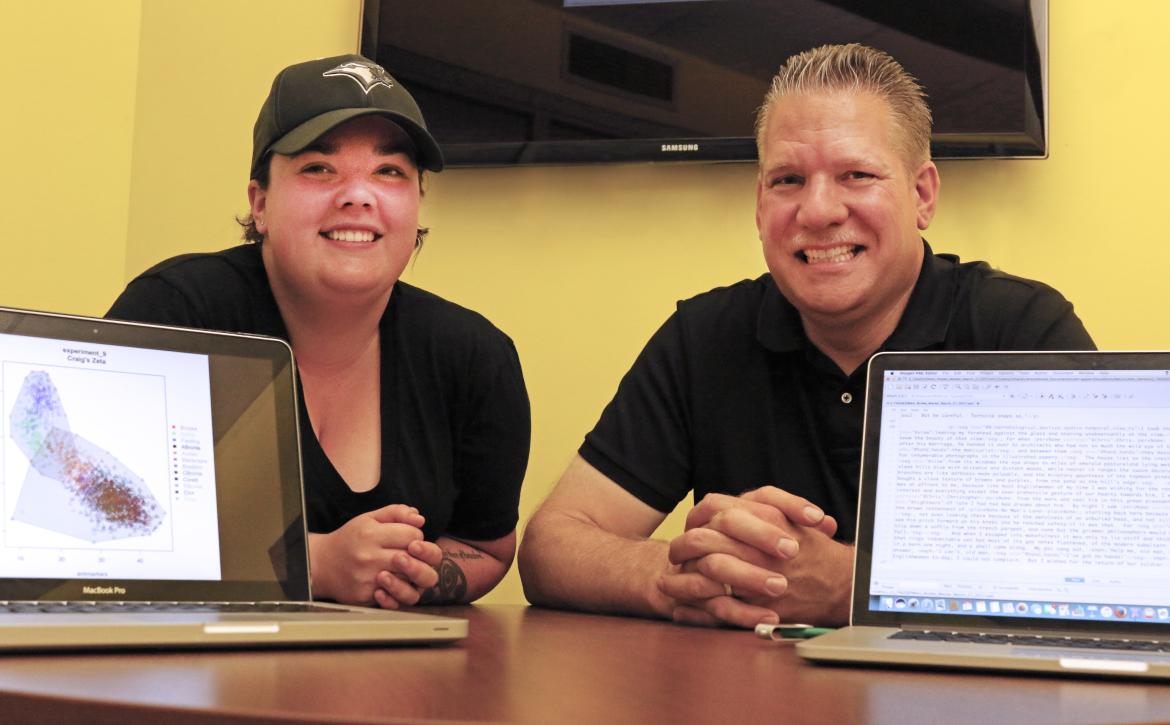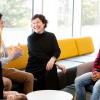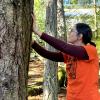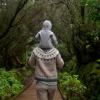
A new course at VIU introduces students to the growing field of digital humanities, which uses computer technologies to study traditional texts in new ways. English Professor Dr. Richard Lane and his former student, Melisa Jones, show off examples of an individual digitized text and a cluster of digitized texts put through an analytics tool.
June 30, 2017 - 2:00pm
Course uses computing tools to look at traditional texts in new ways
Vancouver Island University (VIU) Creative Writing and English alum Melisa Jones loves Victorian novels. She also loves computers, and a new course at VIU helped her combine these two passions and discover a talent for research that has driven her to pursue a master’s degree.
That life-changing course is English 392: Topics in Digital Humanities. Jones describes digital humanities as a collaboration between computer science and the arts. Researchers use digital tools and methods to study the humanities in new ways that allow them to gain a deeper understanding of societal shifts, trends and other issues. The discipline recognizes that the printed word is no longer the main medium for knowledge production and distribution.
“Digital humanities takes your old-school classic literature and merges it with computer technology,” she says. “What I loved about the class is it was really hands-on and self-driven - you were able to research whatever you wanted as long as you could put it through an analytics tool.”
English 392 is an introductory course that focuses on technology and its link to literature. Students explore digital humanities projects that already exist, experiment with different software applications, try their hand at coding and tagging text, and create their own digitized texts.
“It’s a chance for students to explore what they’re passionate about in a new way,” says Dr. Richard Lane, VIU English Professor and course creator. “Students get access to all kinds of software, applications and digital libraries to play around with during the course. It’s an expanding area of the humanities.”
The digitization process allows texts to become computer-readable in a way that allows students to analyze them for themes and trends. Students can look at both single texts in isolation and large numbers of texts at once, a process Lane calls distant reading, to help them understand how a genre developed or how a societal transformation unfolded.
Jones, who plans to take a year off and then pursue a master’s degree in English with a focus on digital humanities at the University of Victoria, took Jane Austen’s texts and compared them with one another to discover that the prominent themes in Austen’s novels are actually pride and class rather than romance like Jones initially thought.
“It helped me better understand the material I was studying and gave me a new perspective,” says Jones. “I also did another analysis that discovered how close Austen is stylistically to the Brontë sisters.”
The skills Jones learned while digitizing texts have widespread applications beyond her English studies.
“A lot of businesses are going digital, so these skills come in handy,” she says. “The government is also looking for students that can use digital tools.”
Lane, who is also the principal investigator of the MeTA Digital Humanities Lab at VIU, which explores new applications for digitized texts in the humanities, says employers are increasingly looking for people with the digital skills.
“If students advance to grad school, digital humanities is considered a core skill,” Lane adds.
To learn more, visit the English Department course page.
-30-
MEDIA CONTACT:
Jenn McGarrigle, Communications Officer, Vancouver Island University
P: 250.740.6559 | C: 250.619.6860 | E: jenn.mcgarrigle@viu.ca | T: @VIUNews
Tags: Teaching and Learning





